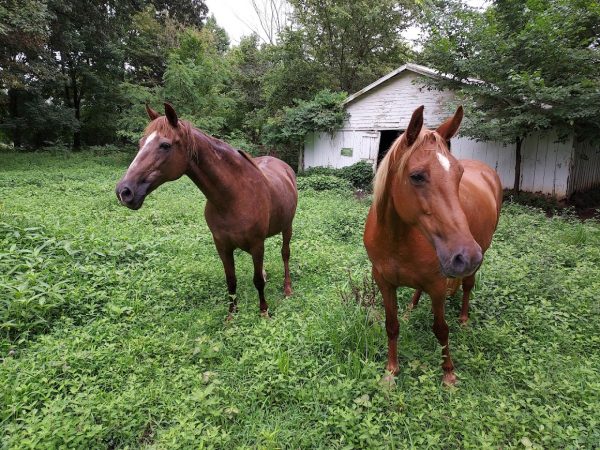
Once you’ve bought a horse, you’re marked. Branded. Like Chuck Connors in his short-lived follow-up series to “The Rifleman.” Bait on a hook lowered to a pit of starving alligators.Such was the case when Kristina informed me that she had her heart set on the horse soon-to-be-known as Angel. A red-coated mare with flaxen mane and tail, she’s a beauty unlike most, Kristina said. She and her herd mate lived in deplorable living conditions in an unkempt, unmanned field where the only housing included a falling-down barn. A stagnant pond was their only water source—all of this alongside a heavily traveled state highway on the way to Brownsville, opposite of Ripley.
After weeks of watching and yearning and quite a bit of research, Kristina found the horse’s owner and made the call: “were they for sale,” she asked?
“Of course, everything’s for sale at the right price!” came the response.
“How much?”
Too much.
“The horse you like,” the owner said, “is a registered Tennessee walker!”
Like that mattered (it didn’t). Kristina wanted these two creatures for the sake of bringing them from their horrid conditions. In the rescue/sanctuary world, papers and prestige don’t matter.
The price remained high — too high for my liking. But Kristina persisted, “Let’s go look at them.”
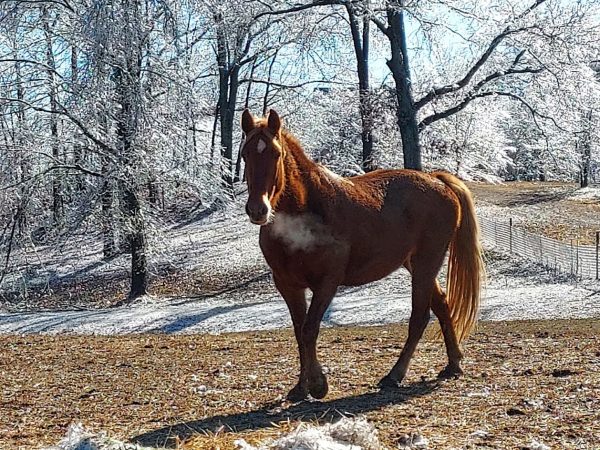 The place they called home was worse than it appeared from the road. Broken, jagged fencing kept them contained. Weeds were their lunch and dinner; the water from the stagnant pond hidden behind what might have once been an impressive barn. The barely upright pile of wood almost too thin and fragile for any weather protection except clear, star-filled nights.
The place they called home was worse than it appeared from the road. Broken, jagged fencing kept them contained. Weeds were their lunch and dinner; the water from the stagnant pond hidden behind what might have once been an impressive barn. The barely upright pile of wood almost too thin and fragile for any weather protection except clear, star-filled nights.
Both of the animals were scared of people. Neither had much human contact. Angel’s herd mate, another mare affectionately named “And,” attempted to kick me during our first meeting — she missed only by inches. “She has a history of doing that,” her owner said with a shrug of his shoulder. (The thought of it still frightens me as it was powerful and undeserved.)
“She’s a show horse,” Angel’s owner beamed proudly while the other tried to kick me.
“We can see why,” we said, unimpressed. “But the price.”
So, we left. The price for the two was too high, and we couldn’t separate them. Kristina, undeterred, kept visiting the horses, praying that they’d make it home.
Every time we passed them on the road, she’d check their condition and make sure they were okay. She yearned for them — she admitted that she wanted them badly. So, we continued to negotiate. The horse’s owners balked and didn’t budge until one day, they finally did.
That settled, they needed to come to the ranch ASAP. Like tomorrow! But blood work is required to transport horses, so we had to wait some more. A horse infected with Coggins can destroy a herd. While it’s not immediately fatal, Coggins is a chronic blood disease, and once it’s on the property, your ranch can become a pariah.
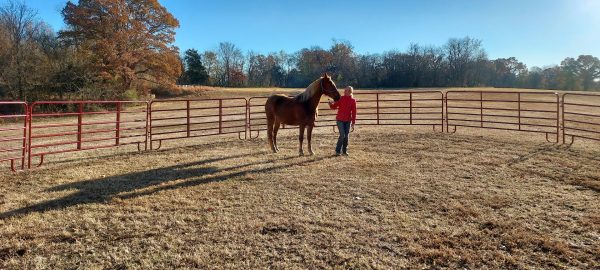 So, we waited impatiently for the horses to be cleared and to arrive. They were only about five miles from their new home, but the time it took to clear them made it seem as if they were on the other side of the globe.
So, we waited impatiently for the horses to be cleared and to arrive. They were only about five miles from their new home, but the time it took to clear them made it seem as if they were on the other side of the globe.
But their coming here wasn’t meant to be. Another call from the owners with devastating news. And, the horse that tried to kick me got herself killed. Caught up in the barn, she attempted to kick through the wood wall. Tangled up, she compound-fractured her leg, so the owner shot her.
Silence followed by devastation. Kristina was beside herself with grief. Then tears and weeping, and grief. We should have, could have, done more, she said! We shouldn’t have waited so long. Now the horse is dead.
Kristina said she had so much potential and promise; she could have helped so many children. She could have, I agreed. Would have. But that wasn’t God’s plan for her.
Despite our delays and negotiations, there was little we could have done for her. Perhaps it was something more. Perhaps God kept her from something that could have happened down the road. Maybe she, with her history of kicking, might have hurt someone.
Even though she was dead, Lady, the red mare with flaxen hair, still needed rescuing. Despite the loss of her pasture mate and our shock, she was still on the way. Soon, she would be ours.
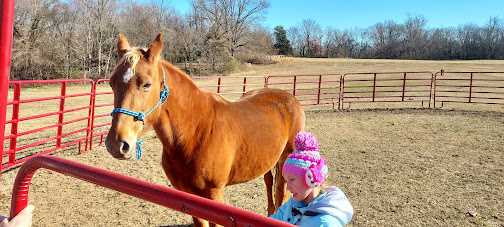 When Angel, formerly known as Lady, arrived, the fear she wore was palatable. Her eyes were large and full orbs, wondering if this road led to an end or a beginning. While she had no way of knowing that the path that she fearfully walked brought her to safe and love-filled place.
When Angel, formerly known as Lady, arrived, the fear she wore was palatable. Her eyes were large and full orbs, wondering if this road led to an end or a beginning. While she had no way of knowing that the path that she fearfully walked brought her to safe and love-filled place.
From the start, Kristina made sure that her life in no way resembled her past. Angel quickly became part of a family with people and horse mates. The exchange of her lead rope from her previous owner to Kristina’s hand more significant in ways we might still not be able to comprehend.
Since she arrived, she’s proven to be one of the most beautiful horses we’ve ever seen, in nature and nurture. She’s also one of the most sensitive and sweet animals we’ve ever been in the presence of. She aims to please in all she does. When she moves her feet, she does so willingly even if she doesn’t know where you want them moved – she’ll just move them to make sure she’s doing what you ask.
When she’s excited and happy or curious about some sort of movement or action from one of her new herd or her people, she flares her nostrils and exhales loudly, in the sweetest way. In the beginning, we thought she might have been wind broke, but that’s just one of her more endearing qualities.
When she moves, she prances with grace and pride in one of the most elegant and magnificent movements on the south side of heaven. In full cantor, her tail lifts like a flag, and her legs prance in coordinated synchronization. She’s a true gift from the Lord above, and as her name suggests, she’s an angel here on earth.
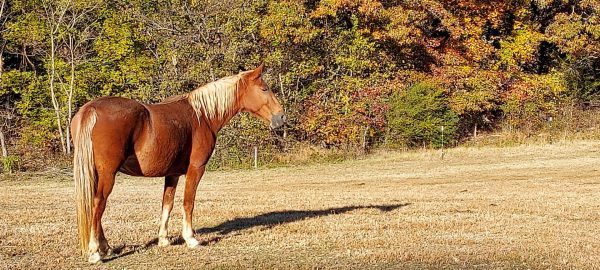 But as for being branded, it’s a mark that doesn’t seem to fade. Texts, instant messages, and phone calls regularly pop up asking if we’re available to take on someone’s broken down, elderly or unrideable horse. For the most part, our answer is the same: “Your” horse has you; we rescue and save those that don’t have anyone else.
But as for being branded, it’s a mark that doesn’t seem to fade. Texts, instant messages, and phone calls regularly pop up asking if we’re available to take on someone’s broken down, elderly or unrideable horse. For the most part, our answer is the same: “Your” horse has you; we rescue and save those that don’t have anyone else.
In the case of Angel (we tried with And), though she was “owned,” she wasn’t receiving regular care; her living conditions were not much better than blight.
Regardless of how often we tell people we simply can’t let them dump their horses on us because they don’t “want them anymore,” the calls still come. We’re branded, after all.
So, it shouldn’t have surprised me when the phone rang one recent afternoon. Not recognizing the number but seeing that it was local, I answered. Instantly I recognized the voice: “You need any horses?”
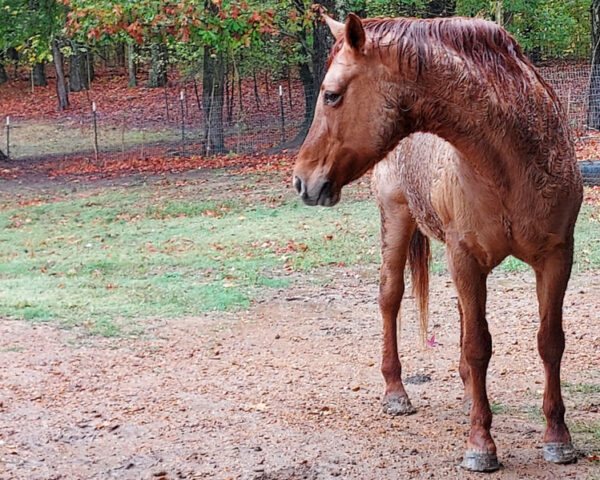 Twix was the ranch’s first resident, coming to live here just before Christmas 2020. Purchased from a local auction, she was likely headed south as part of a meat convoy, where she would have been butchered and shipped overseas for human consumption. But God had other plans for her.
Twix was the ranch’s first resident, coming to live here just before Christmas 2020. Purchased from a local auction, she was likely headed south as part of a meat convoy, where she would have been butchered and shipped overseas for human consumption. But God had other plans for her. 
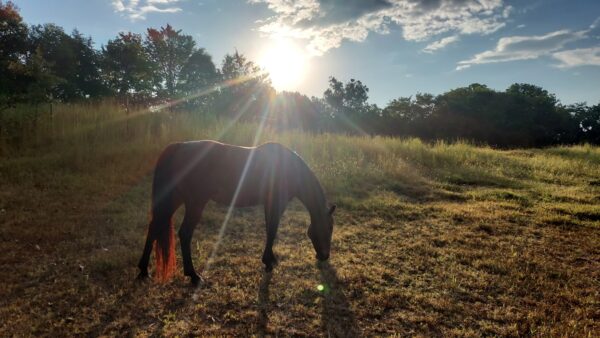

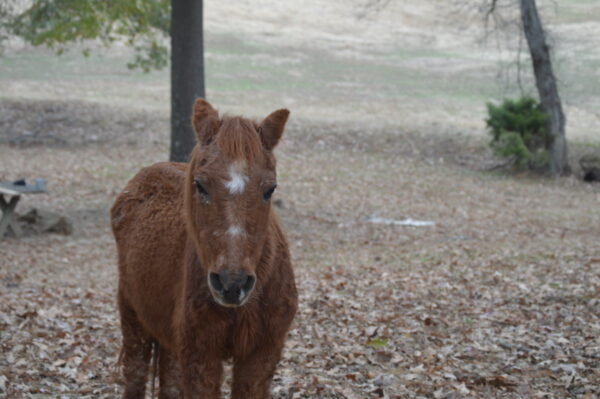 Not every horse becomes an indiscriminate part of its herd, aimlessly following along with the others just because they move about here or there. Even if there’s a pair of them that bond and sidle along side-by-side off to themselves, it’s quite rare for one of the herd to venture off alone, regularly, in search of his or her own pursuits, escaping the strength and protection of the clan.
Not every horse becomes an indiscriminate part of its herd, aimlessly following along with the others just because they move about here or there. Even if there’s a pair of them that bond and sidle along side-by-side off to themselves, it’s quite rare for one of the herd to venture off alone, regularly, in search of his or her own pursuits, escaping the strength and protection of the clan.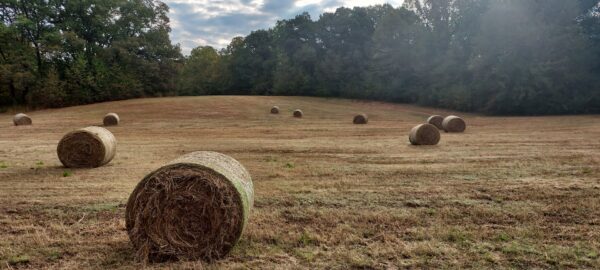
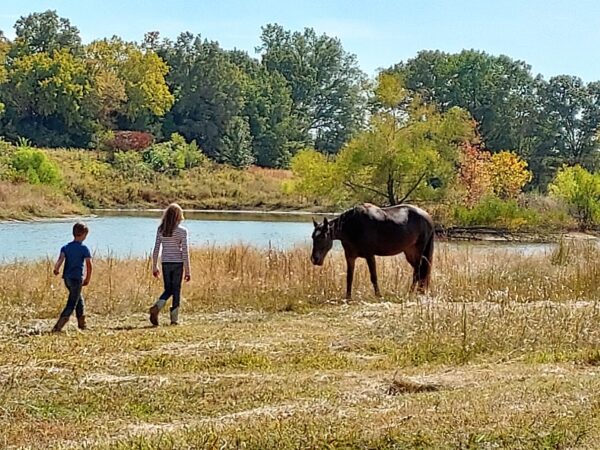
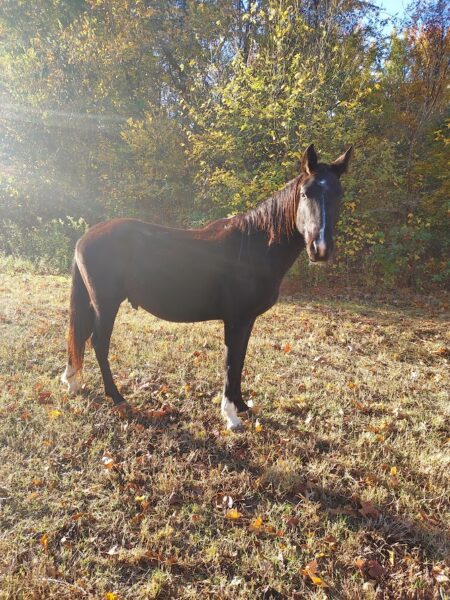
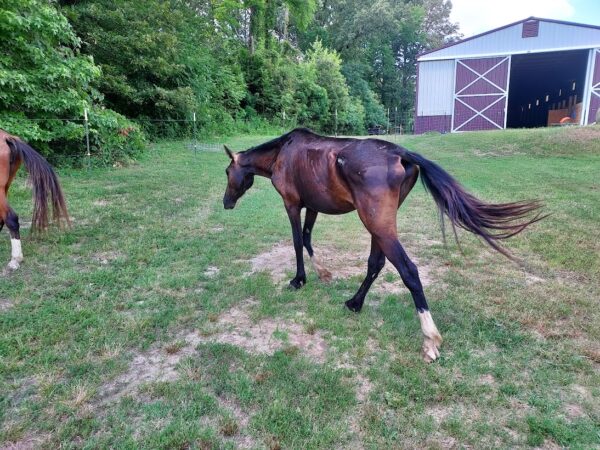
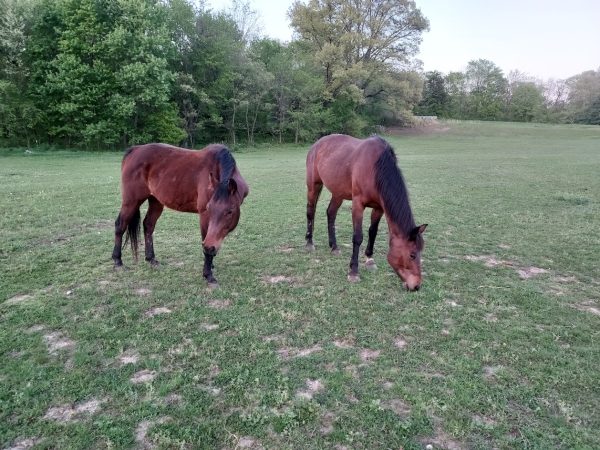

 The place they called home was worse than it appeared from the road. Broken, jagged fencing kept them contained. Weeds were their lunch and dinner; the water from the stagnant pond hidden behind what might have once been an impressive barn. The barely upright pile of wood almost too thin and fragile for any weather protection except clear, star-filled nights.
The place they called home was worse than it appeared from the road. Broken, jagged fencing kept them contained. Weeds were their lunch and dinner; the water from the stagnant pond hidden behind what might have once been an impressive barn. The barely upright pile of wood almost too thin and fragile for any weather protection except clear, star-filled nights. So, we waited impatiently for the horses to be cleared and to arrive. They were only about five miles from their new home, but the time it took to clear them made it seem as if they were on the other side of the globe.
So, we waited impatiently for the horses to be cleared and to arrive. They were only about five miles from their new home, but the time it took to clear them made it seem as if they were on the other side of the globe. When Angel, formerly known as Lady, arrived, the fear she wore was palatable. Her eyes were large and full orbs, wondering if this road led to an end or a beginning. While she had no way of knowing that the path that she fearfully walked brought her to safe and love-filled place.
When Angel, formerly known as Lady, arrived, the fear she wore was palatable. Her eyes were large and full orbs, wondering if this road led to an end or a beginning. While she had no way of knowing that the path that she fearfully walked brought her to safe and love-filled place. But as for being branded, it’s a mark that doesn’t seem to fade. Texts, instant messages, and phone calls regularly pop up asking if we’re available to take on someone’s broken down, elderly or unrideable horse. For the most part, our answer is the same: “Your” horse has you; we rescue and save those that don’t have anyone else.
But as for being branded, it’s a mark that doesn’t seem to fade. Texts, instant messages, and phone calls regularly pop up asking if we’re available to take on someone’s broken down, elderly or unrideable horse. For the most part, our answer is the same: “Your” horse has you; we rescue and save those that don’t have anyone else.